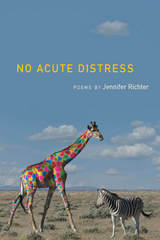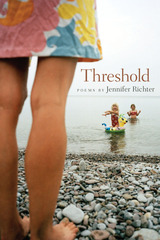
Richter seasons her work with irony from the start, titling the book’s opening poem, “Pleasant, healthy-appearing adult white female in no acute distress.” As the collection progresses, the speaker’s growing children bring new, wider perspective to the poems; the heart of the book opens up to embrace the adolescents’ increasing self-sufficiency and the body’s vibrant re-emergence into health.
No Acute Distress offers readers fresh language grounded in a masterful use of form, speaking with an urgency that acknowledges chronic pain’s cumulative damage to the body and spirit, and with an openness that allows for hope and the inexplicable on the path to victorious recovery.

Jennifer Richter presents a series of poems that explore the many facets of the term "threshold." Throughout the collection, the narrator experiences several acts of threshing, or separating—from birth and the small yet profound distances that part a mother and child, to the separation caused by illness and its toll on relationships. At the same time, she is progressively gathering, piecing together the remnants of her life, collecting her children into her arms, and welcoming a future without pain. Pain is often present in these poems, as the narrator frequently confronts her own threshold for enduring a ravaging illness. Her harrowing struggle through recovery is chronicled by a poem at the end of each section, tracing her powerful journey from deep suffering to a fragile yet steadfast sense of hope.
These gripping lyric and prose poems explore duality in its many forms: the private, contemplative world versus a world of action; the mirror sides of health and sickness; the warmth of a June sun and the deep, long nights of winter; mother and child; collecting and letting go. From the comfort of a morning bed at home to the desperate streets of Hanoi, Threshold is a searing portrait of healing, the courage it takes to bridge the gulfs that divide, and the wonder of the ties that bind.
What Is My Body Without You?
My son’s pajamas unsnapped
on the floor: small husk
of his body relaxing on its back,
legs and sleeves still filled
with his rush. This part of him
hasn’t outgrown my arms
and sometimes lets me lift
him up our steep stairs,
carry him to bed and pull
his shade against the gray
thin winter sky like milk
my daughter wakes up wanting.
In the last days of lifting her
to my breast, I fill her less
than the air already gone
from my son’s flat shape.
Twice like that I have lain back,
the doctor opening me
along the same clean seam.
Each time I was watching:
with a few tugs the child
was out, naked and heading
toward other hands, each child
cut loose before I knew it.
READERS
Browse our collection.
PUBLISHERS
See BiblioVault's publisher services.
STUDENT SERVICES
Files for college accessibility offices.
UChicago Accessibility Resources
home | accessibility | search | about | contact us
BiblioVault ® 2001 - 2024
The University of Chicago Press









